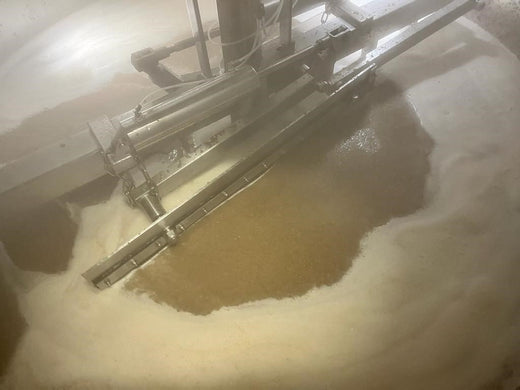Ancient Beer: Fascinating History of Beer by Rosie Buckley
Ancient Beer: Fascinating History of Beer by Rosie Buckley (ContentnCoffee)
Beer is one of the oldest and most widely consumed alcoholic beverages in the world, with a rich and fascinating history dating back thousands of years. From its early origins in ancient civilizations to its present-day status as a global industry, beer has played a significant role in shaping human culture and society. In this article, we will explore the history of beer, its various styles and brewing methods, and its cultural and social significance throughout history. Whether you're a seasoned beer enthusiast or just curious about the world's favourite beverage, join us on a journey through the fascinating and complex world of beer.
The earliest evidence of beer production dates back to ancient Sumeria, located in what is now modern-day Iraq. Sumerian cuneiform tablets, dated to around 4000 BCE, contain recipes for beer made from barley, wheat, and other grains. The ancient Egyptians also brewed beer, with hieroglyphics depicting beer production and consumption dating back to 5000 BCE. Beer was a staple of the Egyptian diet, with workers receiving a daily ration of beer as part of their wages.
Ancient Greece and Roman societies
Beer played an important role in ancient Greek and Roman societies, although it was not as popular as wine. In ancient Greece, beer was known as "zythos" and was typically brewed using barley, wheat, and honey. It was considered a lower-class beverage and was mainly consumed by peasants and slaves. However, it was also used in religious ceremonies, and some Greek philosophers believed that it had medicinal properties. In ancient Rome, beer was introduced from Egypt and was known as "cerevisia". It was brewed using barley, wheat, and sometimes even spelt. The Roman army was known to consume large quantities of beer, and it was also popular among the lower classes. However, wine remained the preferred beverage of the upper classes. Beer was also used as a form of payment for labour in both ancient Greek and Roman societies. For example, soldiers in the Roman army were given a daily ration of beer as part of their pay. Overall, beer was an important part of daily life in ancient Greek and Roman societies, although it was not as highly valued as wine.
The Middle Ages
The Middle Ages were a significant period in the history of beer. During this time, beer was a staple beverage in many European countries, with monks and nuns playing a significant role in its production and distribution. Beer was often considered a safer alternative to water, which was often contaminated, and it provided important nutrients to the population. In the early Middle Ages, beer was typically brewed in small batches using local ingredients, such as barley and hops, and was consumed locally. However, as trade routes expanded and cities grew, larger breweries emerged, with some producing beer on an industrial scale. Monasteries and convents were also important centres of brewing during the Middle Ages, with many developing unique beer styles that are still popular today, such as Trappist and Belgian beers. In addition, the establishment of guilds and the adoption of regulations governing the production and sale of beer helped to ensure quality and consistency in the industry. The Middle Ages were a time of great innovation and experimentation in the brewing industry, laying the foundation for the modern beer industry we know today.
The 19th century
The 19th century saw a significant shift in the production and consumption of beer. At the start of the century, most beer was produced by small local breweries, and beer styles were largely regional. However, by the end of the century, the brewing industry had undergone a significant transformation due to advances in technology, efficient storage and changes in consumer tastes. The development of industrialization and mass production techniques led to the consolidation of the brewing industry, with large national and international breweries emerging. The invention of refrigeration in the mid-19th century also allowed for the production of lagers, which quickly became the most popular beer style in the world. In addition, the rise of the temperance movement and the prohibition movement led to the establishment of laws and regulations governing the production and sale of alcohol, which had a significant impact on the brewing industry. Despite these challenges, the 19th century was a period of significant growth and innovation for the beer industry, laying the foundation for the modern brewing industry we know today.
The 20th century
This was period of significant change and development in the history of beer. The early part of the century saw the continuation of trends from the 19th century, with the rise of national and international brewing conglomerates and the dominance of lager as the most popular beer style. However, the mid-20th century saw a shift towards greater diversity in beer styles, with the emergence of craft breweries and the reintroduction of traditional beer styles such as ales, stouts, and porters. The development of new technologies also had a significant impact on the brewing industry, with advances in refrigeration, pasteurization, and quality control leading to improvements in the consistency and quality of beer. In addition, the globalisation of the beer industry led to the spread of beer culture around the world, with the rise of beer festivals, beer tourism, and a greater appreciation for beer as a cultural and culinary product. However, the 20th century also saw challenges to the beer industry, including the impact of Prohibition in the United States and the introduction of regulations governing the advertising and marketing of alcohol in many countries. Despite these challenges, the 20th century was a period of growth and evolution for the beer industry, shaping the way we think about beer today.
Apr 13, 2023





